Jewish communities around the world have experienced a surge in anti-Semitism since the 11-day Israel-Gaza flare-up began on May 10; but the question remains, what can be done about it?
Experts in human rights and Jewish groups say that education is the long-term answer to this form of hatred, but disagree on the approach.
8 View gallery


A convoy of cars sporting Palestinian flags that drove through a Jewish area of London calling for the rape of Jewish women, May 16, 2021
(Photo: Screenshot)
Jonathan Greenblatt, CEO of the Anti-Defamation League, said that the number of anti-Semitic incidents in the U.S. was up nearly 65% in the two weeks since the start of the recent hostilities between Israel and Hamas in Gaza, as compared to the same period last year leading up to May 10.
One such incident took place across the street from Temple Beth Israel in the Chicago suburb of Skokie, Illinois, where a small group of protestors yelled “From the River to the Sea, Palestine will be Free,” a reference to the destruction of the State of Israel, and “Intifada,” the Arabic word for uprising.
“The following Sunday, our Skokie community gathered in a rally of solidarity against anti-Semitism. About 600 people came, and there were no problems,” says Michael A. Weinberg, the rabbi at Temple Beth Israel.
“So, the impact of the event on the 16th was to bring together the Skokie Jewish community on May 23 across all denominational lines, which I saw as a victory for Jewish unity.”
Weinberg says the last anti-Semitic incident he recalled at the synagogue occurred over 25 years ago, when a group of young people spray-painted swastikas in the back of the building.
“It turned out that it was some neighborhood group of kids and an ‘initiation’ rite. Then, also, the Skokie police handled it appropriately,” he said.
Greenblatt says the response of decision-makers, in particular that of the U.S. president, is crucial to stopping the latest spike in anti-Semitic incidents.
“First and foremost, we are calling on all leaders – politicians included – to use their bully pulpit to speak out loudly and clearly against antisemitism. In particular, we are also calling on the Biden administration to appoint a special envoy to monitor and combat anti-Semitism and elevate it to an ambassador-at-large level,” he says.
8 View gallery
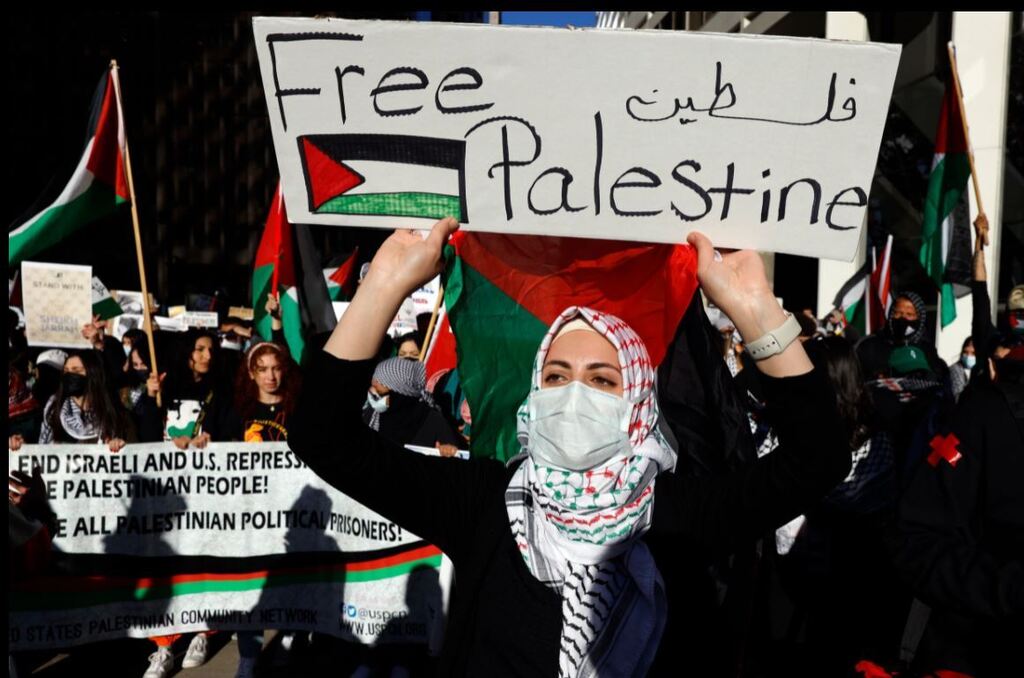

Pro-Palestinian protesters march through the streets of Chicago Loop, May 12, 2021
(Photo: AP)
The envoy post has been vacant since January 20, when President Joe Biden came into office.
“Further, we are asking that the administration reestablish and fill the position of White House Jewish liaison, which will enable clear channels of communication between the White House and the American Jewish community,” Greenblatt added.
The liaison post went unfilled during the Trump administration and remains vacant.
“Other important actions that the administration can take,” Greenblatt said, include: “Hold a White House convened conversation on anti-Semitism; preserve the 2019 executive order on campus anti-Semitism; and invest in security enhancements for religious institutions.”
Sacha Roytman-Dratwa, executive director of the Combat Anti-Semitism Movement (CAM), says that in addition to beefing up security, governments should adopt the International Holocaust Remembrance Alliance (IHRA) Working Definition of Antisemitism, which characterizes this form of racism as a “certain perception of Jews, which may be expressed as hatred toward Jews.
Rhetorical and physical manifestations of antisemitism are directed toward Jewish or non-Jewish individuals and/or their property, toward Jewish community institutions and religious facilities.”
The definition is followed by 11 examples of anti-Semitism, four of which are solely about Israel.
Some 28 countries have adopted the IHRA definition since its 2016 inception.
“The IHRA Working Definition of Antisemitism is one of the tools that help decision-makers and law enforcement agencies to define antisemitism,” says Roytman-Dratwa.
Following adoption, he says the next step in tackling anti-Semitism is reinforcing security at Jewish spaces.
“There is a lot of work to be done. We are working with local authorities’ mayors and municipality leaders and pushing legislatures where we can, but it is not enough,” Roytman-Dratwa says.
“This is a wake-up call for society to join forces and to deal with violence against Jews, because the hatred that we’ve seen is unacceptable and, as we always say: ‘It begins with Jews but never ends with Jews.’”
“Open hatred in the streets of modern democracies shouldn’t be allowed,” he added.
Roytman-Dratwa says that when it comes to global anti-Semitism, he is optimistic about the direction in which the U.S. is going, while urging some reforms in Canada, and calling for Europe to have tougher laws against online Jew-hatred.
“We heard from the Biden administration that they are willing to adopt the IHRA definition. Some cities in Canada are refusing to adopt the IHRA definition, and that needs to change,” he said. “Europe has very strong legislation, but the implementation has a lot of weaknesses.”
“We’ve seen very positive actions in France and Germany by not allowing hate speech to be on the street, but unfortunately it moved online. There needs to be new legislation to stop it, because the legislation they have is apparently not strong enough,” Roytman-Dratwa says.
8 View gallery
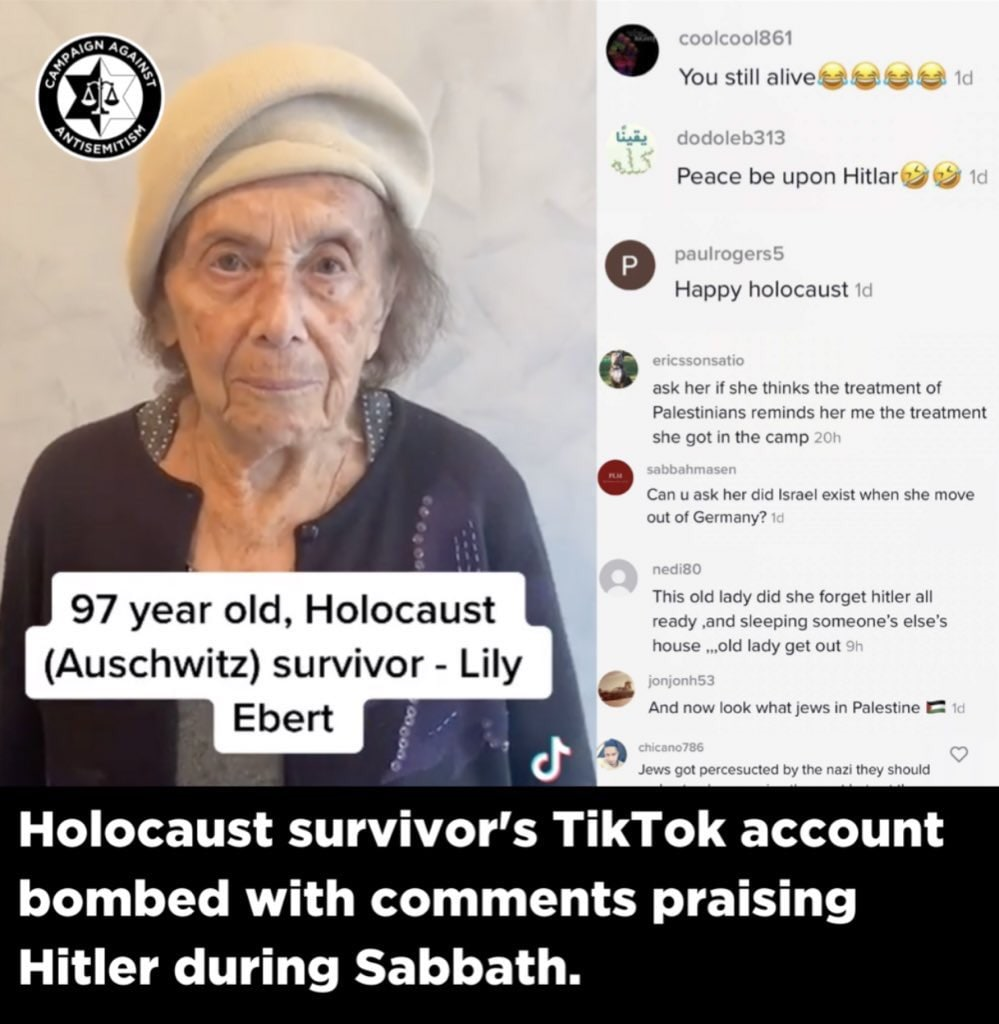

Holocaust survivor Lily Ebert was inundated with anti-Semitic abuse on her TikTok page during the May 2021 war in Gaza
(Photo: Campaign Against Antisemitism)
Ernest Herzog, executive director of operations for the World Jewish Congress, says the social media companies must act to stop anti-Semitism from appearing on their platforms.
“There is always this thin red line of freedom of speech, which is misused to incite hatred and violence in a way that it is no longer free speech,” he says.
“If somebody in Austria or Germany or France were to open a bar, and after a month they noticed a group of neo-Nazis gathering and discussing how to kill Jews, they would not allow this to continue happening. They would do something about it,” Herzog says.
“However, if this happens in a ‘virtual bar,’ the bar owner, whether it’s Facebook or some other social media platform, says they have nothing to do with it," he says.
“In real life, you have responsibility not just legally, but also ethically. That line is being pushed online and is the backbone of hate going viral.”
8 View gallery
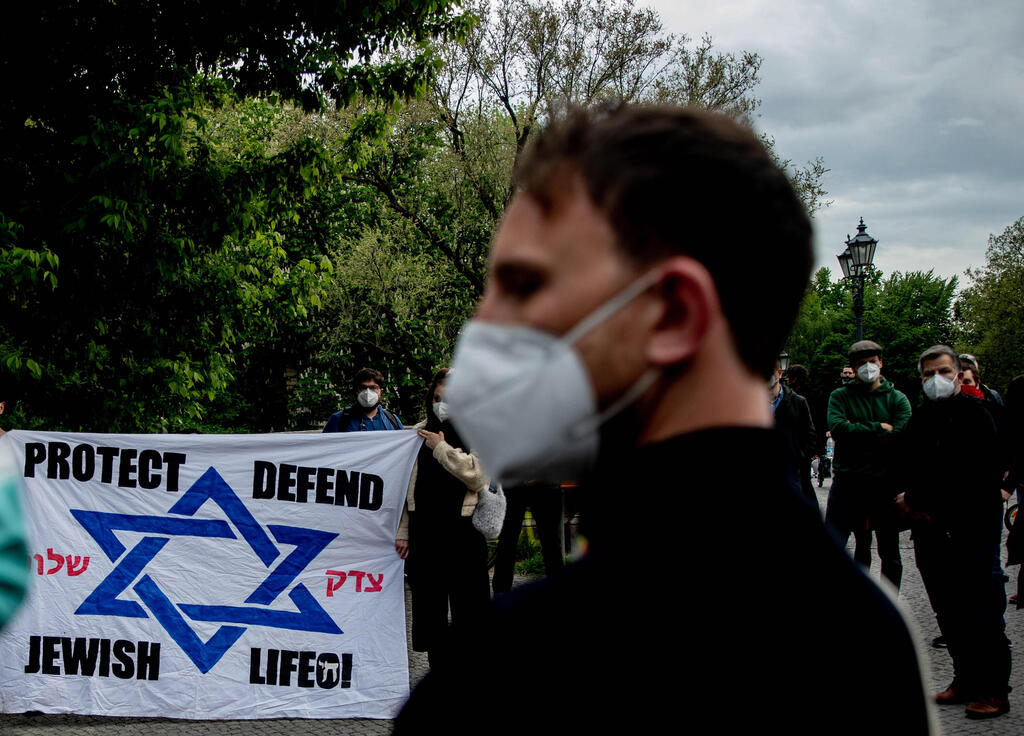

Participants at a vigil against anti-Semitism gather in front of the a synagogue in Berlin, May 16, 2021
(Photo: EPA)
Benjamin Nägele, secretary general of the Jewish Community of Vienna and of the Federation of Austrian Jewish Communities, says the community has faced mainly online anti-Semitic incidents since the latest Hamas-Israel conflict.
“The anti-Semitic incidents were more prevalent online but there were a few unfortunate incidents of physical attacks,” he says.
These attacks have been bolstered by anti-Israel marches, he says.
“There was a major one almost two weeks ago in Vienna, with 2,000 demonstrators. We saw the terror flags of Hamas, the belittling of the Holocaust and anti-Semitic slurs,” Nägele says.
In response, some 500 people attended a solidarity rally on May 20, including senior politicians, among them Wolfgang Sobotka, the president of the National Council, the lower house of the Austrian parliament.
“This was the only event in Vienna in the last two weeks since the conflict began that actually had the word ‘peace’ in the title,” Nägele says.
Roytman-Dratwa says people need to be educated that “anti-Zionism is the new antisemitism” and about the Holocaust.
“We see a lot of Holocaust terminology used to describe what’s happening with the Palestinians, which is totally wrong and a kind of antisemitism when you look at the IHRA definition and the examples,” he says.
8 View gallery


Pro-Israel demonstrators attend a rally denouncing anti-Semitism in Manhattan, May 23, 2021
(Photo: AFP)
However, Benjamin Ward, deputy director of Human Rights Watch’s Europe and Central Asia Division and author of “Europe’s Worrying Surge of Antisemitism,” which was posted as a dispatch on HRW’s website on May 17, says the IHRA definition is helpful, but can be overbroad.
“I do think it is fundamentally important to note that this important effort to combat antisemitism does not come at the expense of people’s ability to speak out about events in the Middle East,” he says.
“Taking those examples [in the IHRA definition] to provide some guidance on how to approach the delineation of speech which is or isn’t anti-Semitic is fine, but there is a risk of overreach if the illustrative examples are taken as a hard and fast category that always constitute anti-Semitism in trying to apply it,” Ward added.
Educating people about the Holocaust should use a regional approach, he says.
“I think that’s also important in allowing for a proper focus on tackling antisemitism in Europe. We need to see antisemitism as a European issue that needs a European solution rather than always seeing it through the prism of the events of the Middle East,” Ward said.
The criminal justice system and security are important tools in dealing with the rise of antisemitism, but stepped-up education is the only way to tackle the root cause of anti-Semitism in Europe, he says.
“There is generally a kind of a good response when it comes to a kind of policing approach… I think that this is where there is perhaps a need for more attention and more focus on the issue of how one addresses these attitudes and views,” Ward says.
“That really comes down much more to the question of civic education and also being able to have a conversation in society and in communities about where this hate comes from and how we can address it.”
8 View gallery
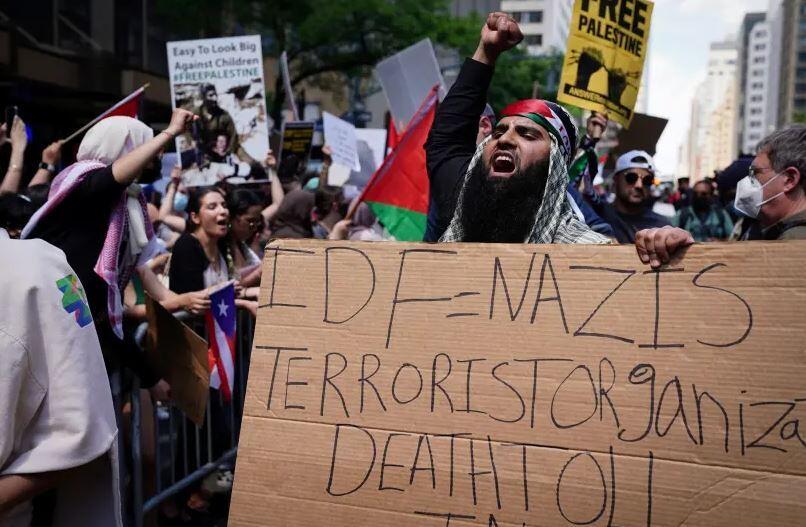

Pro-Palestinian supporters demonstrate near the Israeli Consulate in Manhattan, May 18, 2021
(Photo: Reuters)
Herzog says that the IHRA definition is useful for authorities who are not necessarily familiar with the topic.
“The IHRA definition serves as a guide on the ground for different parts of society to understand what antisemitism,” he said. “It’s a good starting point on teaching what antisemitism is.”
However, he notes that the IHRA definition is very clear about what is anti-Semitism regarding Israel. Therefore, statements like, “I don’t agree with Israeli policy on use of power” or criticism of the prime minister’s policy would not, he says, fall under the category of antisemitism.
Education on anti-Semitism should not be taught as a stand-alone topic, as that would single out Jews, Herzog says.
“Anti-Semitism can be taught on various different age levels; this should be taught as part of a larger course which talks about hate speech or violence or civil rights. We have Islamophobia and homophobia and all these other forms of hatred that should be addressed as well,” he says.
8 View gallery
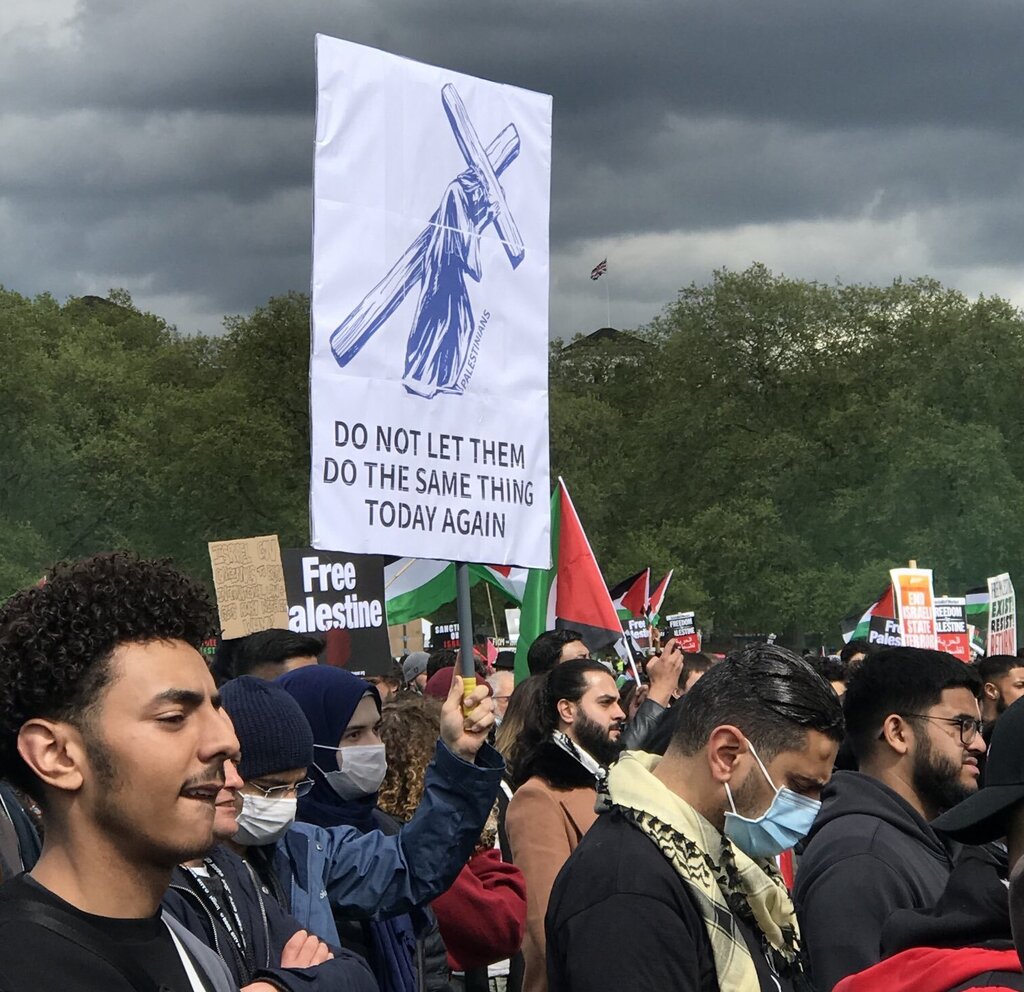

An anti-Semitic banner at a pro-Palestinian demonstration in Hyde Park, London in May 2021
(Photo: Twitter)
Herzog also says education is crucial for combating this rise in anti-Semitism, because Jewish students are targeted on college campuses and high schools, and even at younger ages in elementary school and middle school.
He is referring to students like 15-year-old Rebecca Smits, of Corvallis, Oregon. In the midst of the recent Hamas-Israel conflict, she said that her teacher told the class that the decades-long Israel-Palestinian conflict was “relatable” because it was akin to the Europeans colonizing Native American land in what is now America.
“It was hard because the words ‘Jewish’ and ‘Jew’ were used interchangeably with Israel,” Smits says. “As a Jew not living in the Middle East, it was uncomfortable to me for someone to make such a comparison so black and white and compare it to a separate event in history.”


